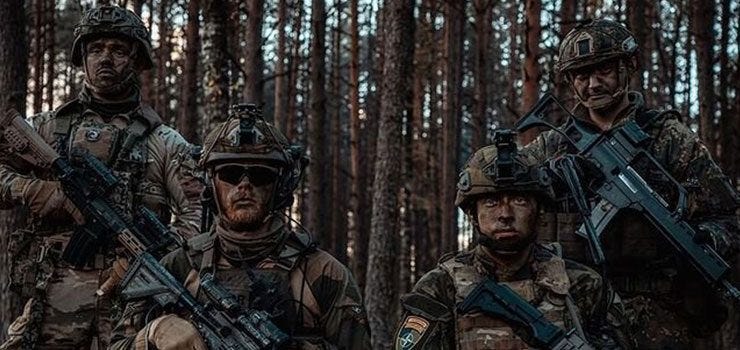Germany returns
The unintended triumph of Putin's policy: a united, awaked, Germany, one armed to the teeth
Today in the magazine: Adam Garfinkle discusses the revolution in Europe. Germany’s emergence as a true global power, he argues, with a military to match its economy, will shape the future far more than the fate of Ukraine—or even Russia.
B.L. HENDRIKS, by the way, agrees with Garfinkle—
Germany has now decided that enough by way of sackcloth and ashes is enough. For one hundred years, Germany found itself too large for Europe but too small for the international arena. The advent of a truly technological civilization has now given Germany the means to transcend or otherwise ignore its classical geographical limitations. They may well decide to go nuclear, and if they do their technical and scientific strengths will allow them to develop a nuclear arsenal in a matter of months, not years.
And there you have it: the unintended triumph of Putin's policy: a united, awaked, Germany, one armed to the teeth. Once these people have their hands on real weapons, does anyone doubt that something of that old German wir können das schaffen will return? Heute Deustchland, morgen, die Welt. Germany may try to divide central Europe with Russia once again, but I doubt it. Far more likely, it seems to me, will be a German decision to at long last bring to completion the rational part of Hitler’s foreign policy, which was to establish Germany as the leading power in a united Europe. This is hardly a prospect calculated to please France, Italy, Greece, even Spain; but it will be welcomed by a weakened and distracted United States, and historical misgivings aside, by most of central Europe, too. Worried about NATO, Vlad? Wait until you see German army units in forward deployment. You will at once be able to tell them apart from Russian army units: their weapons work. The age of small independent nation states is over.
Read ADAM GARFINKLE in the magazine.
Also, don’t miss read JOSHUA TREVIÑO’s review of The Napoleonic Wars: A Global History, by Alexander Mikaberidze.
Did the Napoleonic wars require Napoleon? Mikaberidze does not directly address it, but his book provides an answer of sorts: no, to an extent. The genius, the drama, the tragedy, the glitter of the age required Napoleon. The Sun of Austerlitz and the awfulness of the Imperial Guard’s repulse at Waterloo are unthinkable without the man so great as to lend his name to an entire era. But the underlying issues—France writhing in the power of a people’s revolution, Austria tottering, Germany awakening, Russia ascending, Britain stepping into modernity and therefore mastery—were all present without the Emperor. These convulsions across the face of the earth would not have happened in the same way without the Emperor. But they would have happened, somehow, sometime. …






The Germans have proven themselves less able to wield imperial power in a responsible manner then the *Chinese*. The idea that Germany has repented of its ethnocentrism is a joke; just ask Southern Europe. If the Germans wish to contribute to European security they can fund military buildups in other EU member states. They must not be allowed to become a military power themselves.
I am going to repost here what I said on Twitter which is we are perhaps still putting the cart before the horse: I am going to throw some cold water on the Germany going nuclear question for now at least. While weapons and energy are significantly different forms of nuclear I don't see Germany going for the former at a minimum until it reverses it's position on the later which is "still" something yet to be announced. For example last week the govt announced the last 3 nuclear power plants scheduled to close at the end of this year are "still" scheduled to close at the end of the year. Technology wise Germany in the course of pulling out of nuclear power also choose to sell of much of it's nuclear related R&D and expertise to the French state. Right now there are several thousand of the best German nuclear engineers in Germany working essentially for the French govt outside of Nurnberg currently helping to develop France's future nuclear plans. But all this means that France needs to start thinking about it's own plans if it wants to remain the EU's only nuclear power and it's non proliferation commitments to states outside of Europe.
Something else to keep in mind is France is about 25 years away from overtaking Germany in population. Which is perhaps to get to what I might consider the more important strategic question I already alluded too which is how does France respond to all of this? What is France's role going to be in states between Germany and Russia in short, medium, and long(when France overtakes Germany in population wise). What position does France take in the short and medium(I suspect realistically only in the medium term) towards other EU Member States seeking a more active nuclear weapons role? Do you fight this desire when and if it comes up or do you work with it keeping in mind it will be tremendously easier for say Germany or the Netherlands to go nuclear with at least some French assistance(even purely non nuclear assistance) than to have to fight France tooth and nail. How does the rest of the world respond to Europe seemingly shredding the Non Proliferation Treaty?
**I will add that Poland who doesn't like Germany or Russia and also dislikes Franco-German-Other Western Europe dealmaking will be the big loser in all of this especially the current both Russian and German sceptic PIS govt.